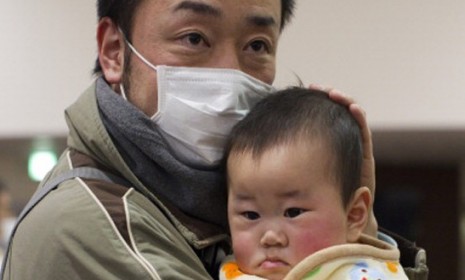Has Japan 'lost the race' to prevent a total nuclear meltdown?
Nuclear fuel apparently melts through the bottom of a container at one of the Fukushima reactors, heightening fears of a major meltdown

A free daily email with the biggest news stories of the day – and the best features from TheWeek.com
You are now subscribed
Your newsletter sign-up was successful
The disaster at Japan's troubled Fukushima Daiichi nuclear plant is getting worse: Trace amounts of plutonium have been found in the soil outside the plant, the seawater outside the reactors has radioactive iodine-131 at levels 3,355 times above what's considered safe, and, according to former GE nuclear safety researcher Richard Lahey, Japan appears to have "lost the race" to save reactor 2 from a full nuclear meltdown. Here, a brief guide to the unraveling situation:
How has Japan "lost the race"?
The nuclear cores of four reactors have partially melted, officials believe, but in reactor 2, "the indications we have... suggest that the core has melted through the bottom of the [steel containment] pressure vessel" and onto the cement floor, Lahey tells The Guardian. That would escalate the radiation contamination, but even in a worst-case scenario, "it's not going to be anything like Chernobyl."
The Week
Escape your echo chamber. Get the facts behind the news, plus analysis from multiple perspectives.

Sign up for The Week's Free Newsletters
From our morning news briefing to a weekly Good News Newsletter, get the best of The Week delivered directly to your inbox.
From our morning news briefing to a weekly Good News Newsletter, get the best of The Week delivered directly to your inbox.
Where are the leaks coming from?
Experts aren't sure, but the highly radioactive water in tunnels and basements at the plant, and plutonium in the soil, are worrisome. There's "a complex cacophony of different sources that could have contributed to the leaking water," says nuclear engineering expert Robin Grimes. The most likely are cracks in reactor core vessels, or runoff from the water being used in the last-ditch efforts to keep the cores from melting. Journalist Martin Savidge says the radioactive water in the tunnels is probably responsible for the toxic seawater, since the only obstacle in its path is "sandbags to block drainage pipes."
Is anyone still there?
Yes. Japanese workers are reportedly being offered up to $1,200 a day to brave the potentially deadly conditions at the plant. They are sleeping over a lead-lined sheet in an earthquake-proof building. "The working environment is very tough," acknowledged Kazuma Yokota, head of the nuclear inspection office. Not working is Tokyo Electric Power Company (Tepco) President Masataka Shimizu, who was hospitalized Tuesday for dizziness and high blood pressure. Tepco Chairman Tsunehisa Katsumata, 71, took the reins.
A free daily email with the biggest news stories of the day – and the best features from TheWeek.com
What will happen to the plants?
When the crisis is contained, at least four of the reactors will be permanently mothballed, Tepco says. Japan's government has called for all six reactors to be shut. In the meantime, the company is exploring ways to contain radiation leaks, including spraying resin on the ground to trap the radioactive particles, and covering the reactors with a special sheet. Japan is also talking about bringing in tanker ships to store the radioactive water pumped from the site.
Is there any good news?
The radiation in the ocean is expected to disperse and become harmless, and the plutonium levels in the soil are not high enough to harm humans, at least not yet. Also, the Japanese government hasn't been sugarcoating the problem, as widely feared, according to Greenpeace. The anti-nuclear group sent scientists to Japan specifically to keep the government honest, but "there is no contradiction between Greenpeace data and local data."
Sources: Telegraph, Guardian, AP, New York Times, CNN, Monsters & Critics, Daily Mail
-
 Political cartoons for February 17
Political cartoons for February 17Cartoons Tuesday’s political cartoons include a refreshing spritz of Pam, winter events, and more
-
 Alexei Navalny and Russia’s history of poisonings
Alexei Navalny and Russia’s history of poisoningsThe Explainer ‘Precise’ and ‘deniable’, the Kremlin’s use of poison to silence critics has become a ’geopolitical signature flourish’
-
 Are Hollywood ‘showmances’ losing their shine?
Are Hollywood ‘showmances’ losing their shine?In The Spotlight Teasing real-life romance between movie leads is an old Tinseltown publicity trick but modern audiences may have had enough